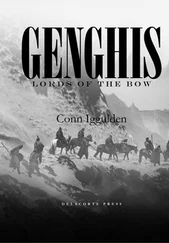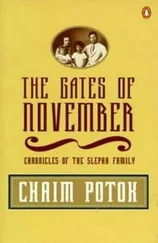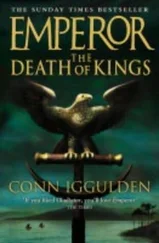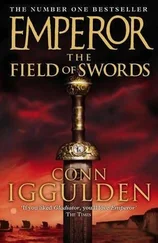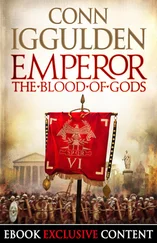1 ...8 9 10 12 13 14 ...85 "I saw him prepare for those matches. The cloth he used allowed in enough light to see the outlines of shapes. That was all the edge he needed. After all, his opponents thought he was blind."
"Take a big purse for hiring trainers. The circus will be the place to find them, but I will want your eye for the sound of limb and honor."
"I am, as always, your man, sir. I will send a message tonight to collect the tickets on the estate purse. If there is nothing else?"
"Only my thanks. I know how skillfully you keep this place afloat. While my senatorial colleagues fret at how their wealth is eroded, I can be calm and smile at their discomfort." He stood and shook hands in the wrist grip that all legionaries learned.
Tubruk was pleased to note the strength still in the hand. The old bull had a few years in him yet.
Gaius scrambled away from the door and ran down to see Marcus in the stables. Before he had gone more than a little way, he paused and leaned against a cool white wall. What if he was still angry? No, surely the prospect of circus tickets-with unchained lions no less!-surely this would be enough to burn away his sorrow. With renewed enthusiasm and the sun on his back, he charged down the slopes to the outbuildings of teak and lime plaster that housed the estate's supply of workhorses and oxen. Somewhere, he heard his mother's voice calling his name, but he ignored it, as he would a bird's shrill scream. It was a sound that washed over him and left him untouched.
The two boys found the body of the raven close to where they had first seen it, near the edge of the woods on the estate. It lay in the damp leaves, stiff and dark, and it was Marcus who saw it first, his depression and anger lifting with the find.
"Zeus," he whispered. "Tubruk said he was sick." He crouched by the track and reached out a hand to stroke the still-glossy feathers. Gaius crouched with him. The chill of the woods seemed to get through to both of them at the same time, and Gaius shivered slightly.
"Ravens are bad omens, remember," he murmured.
"Not Zeus. He was just looking for a place to die."
On an impulse, Marcus picked up the body again, holding it in his hands as he had before. The contrast saddened both of them. All the fight was gone and now the head lay limply, as if held only by skin. The beak hung open and the eyes were shriveled, hollow pits. Marcus continued to stroke the feathers with his thumb.
"We should cremate him-give him an honorable funeral," said Gaius. "I could run back to the kitchens and fetch an oil lamp. We could build a pyre for him and pour some of the oil over it. It would be a good send-off for him."
Marcus nodded and placed Zeus carefully on the ground. "He was a fighter. He deserves something more than just being left to rot. There's a lot of dry wood around here. I'll stay to make the pyre."
"I'll be as quick as I can," Gaius replied, turning to run. "Think of some prayers or something."
He sprinted back to the estate buildings, and Marcus was left alone with the bird. He felt a strange solemnity come upon him, as if he were performing a religious rite. Slowly and carefully, he gathered dry sticks and built them into a square, starting with thicker branches that were long dead and building on layers of twigs and dry leaves. It seemed right not to rush.
The woods were quiet as Gaius returned. He too was walking slowly, shielding the small flame of an oily wick where it protruded from an old kitchen lamp. He found Marcus sitting on the dry path, with the black body of Zeus lying on a neat pile of dead wood.
"I'll have to keep the flame going while I pour the oil, so it could flare up quickly. We'd better say the prayers now."
As the evening darkened, the flickering yellow light of the lamp seemed to grow in strength, lighting their faces as they stood by the small corpse.
"Jupiter, head of all the gods, let this one fly again in the underworld. He was a fighter and he died free," Marcus said, his voice steady and low.
Gaius readied the oil for pouring. He held the wick clear, avoiding the little flame, and poured on the oil, drenching the bird and the wood in its slipperiness. Then he touched the flame to the pyre.
For long seconds, nothing happened except for a faint sizzling, but then an answering flame spread and blazed with a sickly light. The boys stood and Gaius placed the lamp on the path. They watched with interest as the feathers caught and burned with a terrible stink. The flames flickered over the body, and fat smoked and sputtered in the fire. They waited patiently.
"We could gather the ashes at the end and bury them, or spread them around in the woods or the stream," Gaius whispered.
Marcus nodded in silence.
To help the fire, Gaius poured on the rest of the oil from the lamp, extinguishing its small light. Flames grew again and most of the feathers had been burned away, except for those around the head and beak, which seemed obstinate.
Finally, the last of the oil burned to nothing and the fire sank to glowing embers.
"I think we've cooked him," whispered Gaius. "The fire wasn't hot enough."
Marcus took a long stick and poked at the body, now covered in wood ash but still recognizably the raven. The stick knocked the smoking thing right out of the ashes, and Marcus spent a few moments trying to roll it back in without success.
"This is hopeless. Where's the dignity in this?" he said angrily.
"Look, we can't do any more. Let's just cover him in leaves."
The two boys set about gathering armfuls and soon the scorched raven was hidden from view. They were silent as they walked back to the estate, but the reverent mood was gone.
The circus was arranged by Cornelius Sulla, a rising young man in the ranks of Roman society. The king of Mauretania had entertained the young senator while he commanded the Second Alaudae legion in Africa. To please him, King Bocchus sent a hundred lions and twenty of his best spearmen to the capital. With these as a core, Sulla had put together a program for five days of trials and excitement.
It was to be the largest circus ever arranged in Rome, and Cornelius Sulla had his reputation and status assured by the achievement. There were even calls raised in the Senate for there to be a more permanent structure to hold the games. The wooden benches bolted and pegged together for great events were unsatisfactory and really too small for the sort of crowds that wanted to see lions from the dark, unknown continent. Plans for a vast circular amphitheater capable of holding water and staging sea battles were put forward, but the cost was huge and they were vetoed by the peoples tribunes as a matter of course.
Gaius and Marcus trotted behind the two older men. Since Gaius's mother had become unwell, the boys were rarely allowed into the city proper anymore, as she fretted and rocked in misery at the thought of what could happen to her son in the vicious streets. The noise of the crowd was like a blow, and their eyes were bright with interest.
Most of the Senate would travel to the games in carriages, pulled or carried by slaves and horses. Gaius's father scorned this and chose to walk through the crowds. That said, the imposing figure of Tubruk beside him, fully armed as he was, kept the plebeians from shoving too rudely.
The mud of the narrow streets had been churned into a stinking broth by the huge throng, and after only a short time their legs were spattered almost to the knees by filth, their sandals covered. Every shop heaved with people as they passed, and there was always a crowd ahead and a mob behind pushing them on. Occasionally, Gaius's father would take side streets when the roads were blocked completely by shopkeepers' carts carrying their wares around the city. These were packed with the poor, and beggars sat in doorways, blind and maimed, with their hands outstretched. The brick buildings loomed over them, five and six stories high, and once, Tubruk put a hand out to hold Marcus back as a bucket of slops was poured out of an open window into the street below.
Читать дальше
Конец ознакомительного отрывка
Купить книгу



